| Author |
Message |
DTV004

Regular Member

Joined: 30/04/2009
Location: United StatesPosts: 65 |
| Posted: 04:21pm 29 Mar 2010 |
 Copy link to clipboard Copy link to clipboard |
 Print this post |
|
hello to all. question if the wind mill produce 13 to 14 volts what amps i will expect to see on the amp meter from 0 to ?....... thank you. |
| |
Greenbelt

Guru

Joined: 11/01/2009
Location: United StatesPosts: 566 |
| Posted: 09:07pm 29 Mar 2010 |
 Copy link to clipboard Copy link to clipboard |
 Print this post |
|
DTV004,
To Know how much current is passing through the circuit it is necessary to have the generator connected to a Load
If you measure voltage with no load it will show a higher value. Resistance uses up voltage, if you have a large resistance value then you must have more volts to push current(AMPS) through the circuit.
A 12 volt Battery when fully charged will have a resistance value of 12.6 Ohms. or 2.1 ohms in each cell.
What I'm trying to say is, if your mill has 11.6 volts when connected to your Batteries it is not enough to charge them. 13 volts will charge your battery but will take a long time. should have minimum 14.5 for 12 volt Batteries. 28 for 24 volts.
You are doing a good job, Hang in there!
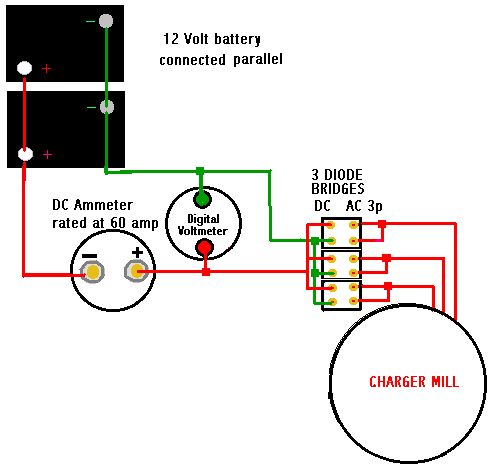
Time has proven that I am blind to the Obvious, some of the above may be True? |
| |
GWatPE
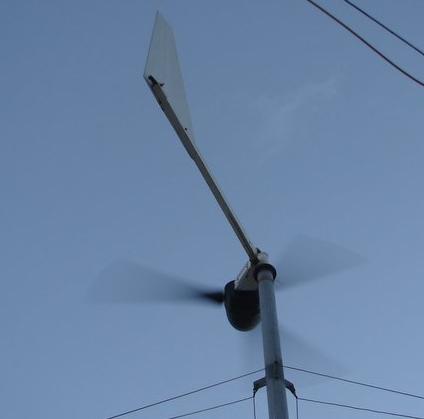
Senior Member

Joined: 01/09/2006
Location: AustraliaPosts: 2127 |
| Posted: 09:55pm 29 Mar 2010 |
 Copy link to clipboard Copy link to clipboard |
 Print this post |
|
The amps, is proportional to the windspeed and the capture area of the rotor and the type of windmill and the mechanical and electrical efficiency and the loading, that affects the efficiencies. Voltage is only 1 component and is not of any real guide without knowing some of the other parameters.
This is a fairly steep learning curve, so don't give up yet.
Gordon.
become more energy aware |
| |
Downwind

Guru

Joined: 09/09/2009
Location: AustraliaPosts: 2333 |
| Posted: 07:10am 30 Mar 2010 |
 Copy link to clipboard Copy link to clipboard |
 Print this post |
|
It all revolves around OHMS LAW ( do a quick google and you will get plenty of easy to understand data)
Volts x Amps = Watts
Volts / Resistance = Amps
Volts / Amps = Resistance
Amps x Resistance = Volts
If you have 2 readings then you can work the others out but just volts on it own dont tell you to much.
Its all a little confusing to start with but it gets easier as you learn.
Pete.
Sometimes it just works |
| |
KarlJ

Guru

Joined: 19/05/2008
Location: AustraliaPosts: 1178 |
| Posted: 11:32am 30 Mar 2010 |
 Copy link to clipboard Copy link to clipboard |
 Print this post |
|
When connected to the battery, and wind is blowing you want to be seeing 20A ++++
to get for example 500W out of your mill
500/14.5 = 34.4A
lets see some pics!
Luck favours the well prepared |
| |
DTV004

Regular Member

Joined: 30/04/2009
Location: United StatesPosts: 65 |
| Posted: 03:21pm 30 Mar 2010 |
 Copy link to clipboard Copy link to clipboard |
 Print this post |
|
i found one old amp and volt meter dc both and a coil like spring i thing is lake a resistor with different size's look like the one come from a heater this come inside with the volt and amp meters ...i will take photos ...by the way thank you for all the help from each of you. |
| |
Downwind

Guru

Joined: 09/09/2009
Location: AustraliaPosts: 2333 |
| Posted: 04:11pm 30 Mar 2010 |
 Copy link to clipboard Copy link to clipboard |
 Print this post |
|
I would think the coil like spring is a shunt resistor for the amp meter.
The power is passed through the shunt and the amp meter is connected across the shunt.
This allows for mV meters to work as a amp meters with all the current flowing through the shunt and not the meter.
The photo should tell us.
Pete.
Sometimes it just works |
| |
DTV004

Regular Member

Joined: 30/04/2009
Location: United StatesPosts: 65 |
| Posted: 09:17pm 30 Mar 2010 |
 Copy link to clipboard Copy link to clipboard |
 Print this post |
|
ok this is the photos 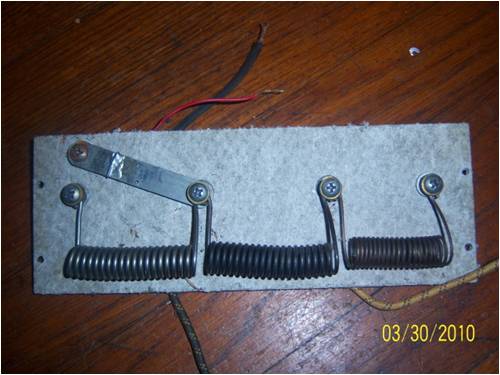
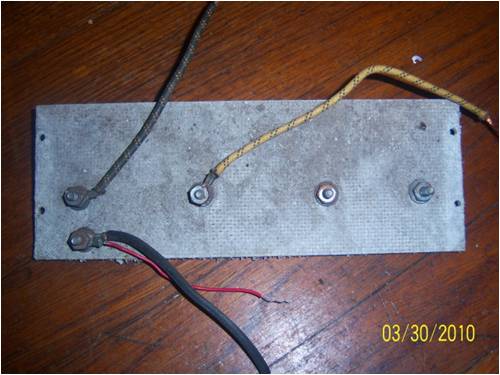
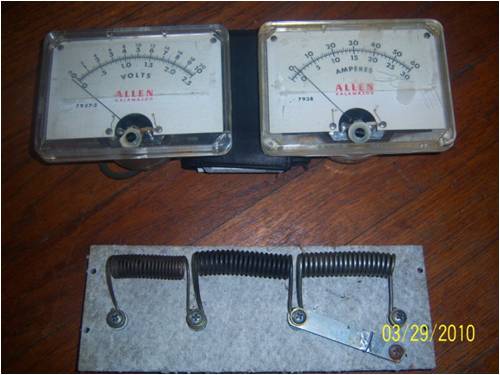
|
| |
GWatPE

Senior Member

Joined: 01/09/2006
Location: AustraliaPosts: 2127 |
| Posted: 10:05pm 30 Mar 2010 |
 Copy link to clipboard Copy link to clipboard |
 Print this post |
|
That looks suspiciously like the asbestos you should not be messing with. take care when you play with old stuff.
Gordon.
become more energy aware |
| |
Greenbelt

Guru

Joined: 11/01/2009
Location: United StatesPosts: 566 |
| Posted: 11:13pm 30 Mar 2010 |
 Copy link to clipboard Copy link to clipboard |
 Print this post |
|
DTV004,
This appears to be a resistor or a old system to regulate voltage to the fields of a large motor controlled by a rheostat (not in photo) just guessing . it appears that the lower scale on the ammeter has been the one in use at the time.
Notice the 2 coils look burned The third one does not and the metal jumper is tapped between coil 2 and 3. The meters in the photo may not have a shunt inside , If not they will be destroyed when hooked to a battery.
I suggest you find an ammeter in an auto parts store or salvage yard, customized instrument panels, Some have amp gauges calibrated in 5 ampere divisions.
this will get rid of the old hardware and guessing how to hook it up.
EDIT; Changed "shunt resistor" to "resistor" and "shunt resistor" ro "shunt"Edited by Greenbelt 2010-04-03
Time has proven that I am blind to the Obvious, some of the above may be True? |
| |
DTV004

Regular Member

Joined: 30/04/2009
Location: United StatesPosts: 65 |
| Posted: 01:15am 31 Mar 2010 |
 Copy link to clipboard Copy link to clipboard |
 Print this post |
|
yes is from old battery charger....ok i will do.Edited by DTV004 2010-04-01 |
| |
KarlJ

Guru

Joined: 19/05/2008
Location: AustraliaPosts: 1178 |
| Posted: 03:50pm 31 Mar 2010 |
 Copy link to clipboard Copy link to clipboard |
 Print this post |
|
you can buy digital ammeters on ebay for $20 use a phone charger or any other 5V supply to power up
Luck favours the well prepared |
| |

